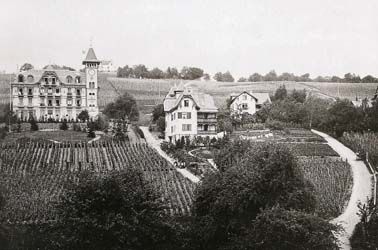During his first years of employment, when his closest friends were not married yet, Franz Kafka took a number of foreign holiday trips either in the company of Max Brod or alone. Detailed accounts of them are contained in the travel journals which they kept in parallel. The light-hearted rivalry resulted in simultaneous descriptions of their experiences and itineraries.
The first of these trips was to Riva on Lake Garda in Northern Italy where they spent ten days in September of 1909. The two friends wrote parallel accounts of an airshow day at nearby Brescia, which were published in the press later that year.
The second trip was to Paris in October 1910. It did not turn out well and Kafka came down with an attack of furunculosis which forced him to return to Prague after only one week. Brod took extensive notes of it and later described it in three newspaper articles, while Kafka only wrote down a few comments about the trip on the inside cover of the notebook in which he kept his diary. At the end of 1910 Kafka made up for the curtailed trip to Paris by visiting Berlin.
The third journey took Kafka and Brod on an 18-day tour from Lugano to Paris via Milan at the end of August and beginning of September 1911. Kafka extended his holiday with a stay in a sanatorium in Erlenbach near Zürich. The two friends also brought back a literary trophy from the trip in the form of parallel journals, Brod’s being, as usual, more elaborate. Typically, Kafka’s record is shorter and written with hindsight. During their journey Kafka and Brod came up with a plan to write a joint travel novel about two friends. The plan did not come to fruition, however, although a first chapter entitled “Richard and Samuel – A Short Journey through the Countries of Central Europe” was published in the in 1912.
Kafka and Brod travelled together for the fourth time at the end of June and beginning of July 1912, spending a week in Weimar. Once more they wrote parallel travel diaries. Kafka again extended his vacation and spent three days at the Jungborn sanatorium in the Harz Mountains.
In his youth, Kafka dreamed of escaping from Prague to distant places. Towards the end of his life he toyed with the unrealistic notion of emigrating to the promised land: Palestine. Berlin, which he regarded as an ‘antidote to Prague’ was to be a halting point on that journey. As it turned out, it was a city where he was to suffer cruel disappointment on two occasions. The first time, it was his failed attempt to marry Felice Bauer, his Berlin fiancée. The second took place a few months before his death when he suffered material hardship there at a period when his illness was entering its final phase.
Jungborn – 1912
Kafka’s stay at Rudolf Just’s sanatorium in Jungborn in the foothills of the Harz Mountains, “an exemplary institution for pure life in the countryside,” is described in the writer’s diaries and correspondence in much greater detail and colour than his earlier spa treatments. Founded by Adolf Just and managed at that time by his son Rudolf, the sanatorium was comprised of administrative and residential buildings, plus lounges and a dining room, but its main focus was the ‘fresh-air park’ with male and female areas separated by a fence. In each of the areas were simple wooden cabins, and patients would enjoy themselves in the nude in the spirit of a ‘back to nature’ philosophy. The therapy consisted of open-air movement in the nude, combined with hydrotherapy (with servants bringing the water), mud baths and a vegetarian diet. Kafka very much enjoyed his stay there, which helped him re-discover human fellowship. In his diaries he recorded his observations and a number of curious episodes. He described the daily routine which included the early-morning ablutions and exercises invented by J. P. Mueller from Denmark, ball-games, community singing, evening lectures, physical labour for patients (hay-making), nocturnal nude dancing, country walks, and excursions to local towns. He also writes about the pastimes and customs of the local inhabitants, telling how he posed nude for a still life and went dancing in a nearby town.
Riva – 1913
In September 1913, following the first crisis in his relationship with Felice Bauer, Franz Kafka travelled with Dr Marschner, the director of the Insurance Institute, to Vienna to attend a conference on rescue techniques and accident prevention. While there, he attended the Zionist congress then in progress. As in previous years when abroad, he also took the opportunity to extend his stay, spending a week touring Northern Italy, ending up in Riva where he had stayed for ten days with the Brod brothers four years earlier. He spent three weeks there at Dr Hartung’s sanatorium. On this occasion, letters from Riva say little about his surroundings – the society at the spa was international. In letters he shares with his friends his sombre reflections about the crisis in his relations with Felice. In spite of that Kafka had a love affair at Riva with a ‘Swiss woman’ – G.W. – whose mysterious identity has been revealed only recently. She was supposed to be Gerti Wasner, a girl from Gleschendorf, a north German town in the vicinity of Lübeck and Travemünde. This speculation has been challenged since, though.
